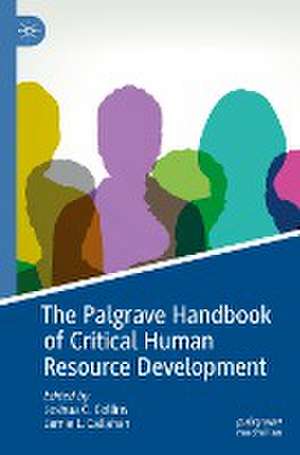The Palgrave Handbook of Critical Human Resource Development
Editat de Joshua C. Collins, Jamie L. Callahanen Limba Engleză Paperback – 18 noi 2023
| Toate formatele și edițiile | Preț | Express |
|---|---|---|
| Paperback (1) | 1387.73 lei 6-8 săpt. | |
| Springer International Publishing – 18 noi 2023 | 1387.73 lei 6-8 săpt. | |
| Hardback (1) | 1393.90 lei 6-8 săpt. | |
| Springer International Publishing – 18 noi 2022 | 1393.90 lei 6-8 săpt. |
Preț: 1387.73 lei
Preț vechi: 1692.36 lei
-18% Nou
Puncte Express: 2082
Preț estimativ în valută:
265.58€ • 275.16$ • 221.64£
265.58€ • 275.16$ • 221.64£
Carte tipărită la comandă
Livrare economică 21 martie-04 aprilie
Preluare comenzi: 021 569.72.76
Specificații
ISBN-13: 9783031104558
ISBN-10: 3031104552
Pagini: 436
Ilustrații: XIX, 436 p. 6 illus., 1 illus. in color.
Dimensiuni: 155 x 235 mm
Greutate: 0.64 kg
Ediția:1st ed. 2023
Editura: Springer International Publishing
Colecția Palgrave Macmillan
Locul publicării:Cham, Switzerland
ISBN-10: 3031104552
Pagini: 436
Ilustrații: XIX, 436 p. 6 illus., 1 illus. in color.
Dimensiuni: 155 x 235 mm
Greutate: 0.64 kg
Ediția:1st ed. 2023
Editura: Springer International Publishing
Colecția Palgrave Macmillan
Locul publicării:Cham, Switzerland
Cuprins
1. Critical and social justice perspectives in human resource development.- 2. Power, privilege, and identity.- 3. Morality and ethics.- 4. Ideology.- 5. Context.- 6. Theorizing culture and communication.- 7. Understanding organizing through storytelling about diversity and difference.- 8. Reflecting on leadership, leading, and leaders.- 9. Reconceptualizing the “organization” and what it means to organize.- 10. Applying technology to organize and resist for social justice.- 11. Theorizing community, intersectionality, and social justice.- 12. Understanding workplace microaggressions, discrimination, civility, and bullying.- 13. Reflecting on relationships, networking, and perceived employability.- 14. Reconceptualizing human capital theory: Defining “expertise” on the global stage.- 15. Applying emotions to reframe employee engagement.- 16. Theorizing learning, knowing, and resisting in spaces of organizing.- 17. Understanding diversity intelligence to enhance individualand organizational learning.- 18. Reflecting on new, emerging, and alternative forms of learning and knowing.- 19. Reconceptualizing performance, learning, and knowing.- 20. Applying learning and knowing to understand, navigate, and develop movements for social justice.- 21. Theorizing the dialectic of critical and radical approaches to change in spaces of organizing.- 22. Understanding the importance of diversity, inclusion, and social justice in facilitating ethical change.- 23. Reflecting on the sustainability of inclusive change.- 24. Reconceptualizing the source and labor of change in spaces of organizing.- 25. Applying critical perspectives to transform consulting.- 26. Theorizing the role of ally attitudes and behaviors in shaping inclusive spaces of organizing.- 27. Understanding the emotional cost and economic value of resistance and advocacy.- 28. Reflecting upon the rise, fall, and re-emergence of unions.- 29. Reconceptualizing the modes and spaces of advocacy.- 30. Applyingadvocacy and social justice through employee resource groups.
Notă biografică
Joshua C. Collins is Associate Professor of Organizational Leadership, Policy, and Development at the University of Minnesota-Twin Cities, USA.
Jamie L. Callahan is Professor of Organization and Ethics at Durham University Business School, UK.
Jamie L. Callahan is Professor of Organization and Ethics at Durham University Business School, UK.
Textul de pe ultima copertă
This handbook presents an expansive exploration of critical theory, critical perspectives, critical praxis, and the impact on the research, theory, and practice of Human Resource Development (HRD). Critical Human Resource Development (CHRD) aims to challenge the normative structures, practices, policies, definitions, and approaches which have historically dominated the field of Human Resource Development (HRD). As an approach to HRD, CHRD raises awareness of social systems, organizational policies and practices, and research paradigms that silence new ways of knowing and understanding, while advancing underrepresented and emerging approaches. Through an analysis of power and privilege, morality and ethics, and ideology and context, CHRD situates diversity, equity, inclusion, social justice, and resistance as a path forward in a rapidly-changing global society. In contrast to HRD’s traditional focus on organization development, training and development, and career development,this handbook adopts a more critical vantage point which classifies the scope and outcomes of HRD across five domains identified by CHRD scholars as key to understanding the nature and work of the field— organizing, relating, learning, changing, and advocating.
Caracteristici
Fills a need in the discipline of HRD for a comprehensive text introducing, explaining, and advancing critical theory Seeks to challenge dominant paradigms related to what HRD can and should be doing to advance human development First text to provide a comprehensive look at the past, present, and future of CHRD theory, research, and practice
